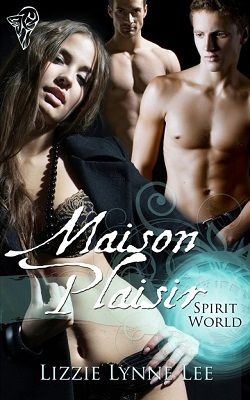In Lizzie Lynn Lee's enchanting novel, Maison Plaisir (Spirit World 1), readers are whisked away to a realm where the boundaries between the mortal and the supernatural blur, creating a tantalizing narrative that explores desire, identity, and the complexities of love. The story centers around Isabelle Beaumont, a shy and introverted young woman who finds herself trapped in the expectations of her family, particularly the pressure to secure a suitable husband. This premise sets the stage for a captivating exploration of self-discovery and the power dynamics inherent in relationships.
From the outset, Lee establishes a rich and immersive world within the walls of Maison Plaisir, a pleasure house catering to spirits and otherworldly beings. The setting itself is almost a character, filled with mystery and allure, drawing both Belle and the reader into its depths. The author’s vivid descriptions create a sensory experience that allows readers to visualize the opulence and enchantment of the establishment, making it a perfect backdrop for the unfolding drama.
Isabelle, or Belle as she is affectionately known, is a relatable protagonist. Her internal struggles resonate with anyone who has felt the weight of familial expectations. The emotional turmoil she experiences is palpable, especially as she grapples with her past heartbreak and the looming threat of an unwanted marriage. Lee skillfully portrays Belle's journey from a timid girl to a woman who begins to embrace her desires and assert her agency. This character development is one of the novel's strongest aspects, as it reflects a universal theme of self-empowerment.
As Belle navigates her predicament, she encounters Armand Shah, the Duke of the Seventh Realm, and his cousin Hervé De Silvano, both of whom are drawn to her in ways that transcend mere attraction. Armand, with his regal demeanor and otherworldly charm, represents the allure of the unknown, while Hervé adds a layer of competition that heightens the stakes for Belle. The dynamic between these three characters is expertly crafted, with tension and chemistry that keep readers engaged. Lee deftly explores the theme of choice versus destiny, as Belle must decide whom to trust and love in a world where both are fraught with complications.
The interplay between the mortal and supernatural realms is another compelling theme in Maison Plaisir. Belle's skepticism about the existence of otherworldly beings serves as a narrative device that allows readers to experience the unfolding magic alongside her. As she is drawn deeper into the world of Fae lords and their seductive powers, her transformation becomes a metaphor for embracing the unknown and the acceptance of one's desires. Lee's exploration of belief and the acceptance of the fantastical is both refreshing and thought-provoking, inviting readers to reflect on their own perceptions of reality.
Moreover, the novel does not shy away from addressing the complexities of love and desire. The relationships in the story are multi-faceted, with each character representing different aspects of attraction and connection. Armand embodies the protective and passionate lover, while Hervé introduces a more playful and competitive energy. This duality creates a rich tapestry of romantic tension that keeps readers guessing about Belle's ultimate choice. Lee's ability to weave these relationships into a cohesive narrative is commendable, as it adds depth to the characters and their motivations.
Another noteworthy aspect of the novel is its exploration of consent and agency. Belle's decision to hire an escort as a means of escaping her family's pressure is a bold move that reflects her desire for autonomy. Lee handles this theme with sensitivity, emphasizing the importance of choice in relationships. The interactions between Belle and the Fae lords are not merely about physical attraction; they also delve into the emotional and psychological aspects of intimacy, making the romance feel authentic and grounded.
In terms of pacing, Maison Plaisir strikes a balance between world-building and character development. The plot unfolds at a steady rhythm, allowing readers to fully immerse themselves in the intricacies of Belle's life and the enchanting world around her. Lee's writing is fluid and engaging, with moments of tension that propel the story forward while also allowing for introspective pauses that deepen character exploration.
Comparatively, readers who enjoy works by authors such as Sarah J. Maas or Jennifer L. Armentrout will likely find much to appreciate in Lee's storytelling style. The blend of romance, fantasy, and character-driven narratives creates a familiar yet unique reading experience that appeals to fans of the genre. Lee's ability to create a compelling love triangle, coupled with the supernatural elements, positions Maison Plaisir as a noteworthy addition to the realm of paranormal romance.
In conclusion, Maison Plaisir (Spirit World 1) by Lizzie Lynn Lee is a captivating tale that masterfully intertwines themes of love, desire, and self-discovery within a richly imagined world. The character development, particularly that of Isabelle, is both relatable and inspiring, making her journey one that resonates deeply with readers. With its enchanting setting, complex relationships, and thought-provoking themes, this novel is sure to leave a lasting impact. Lee's ability to blend the mundane with the magical invites readers to reflect on their own desires and the choices they make in the pursuit of love.
























Reviews 0
Post a Reviews: